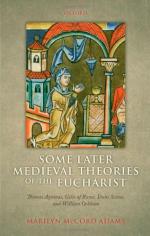|
This section contains 5,278 words (approx. 18 pages at 300 words per page) |

|
SOURCE: "Intuitive Cognition, Certainty, and Scepticism in William Ockham," Traditio, Vol. XXVI, 1970, pp. 389-98.
In the following essay, Adams summarizes Ockham's doctrine of intuitive cognition, explains why it does not lead to scepticism, and explores some problems in its logic resulting from particular admissions of Ockham.
Ockham's doctrine of intuitive cognition lies at the heart of his epistemology. As Philotheus Boehner1 and Sebastian Day2 have quite rightly observed, one of the central aims of this doctrine is to answer the question how the intellect can have certain knowledge of contingent states of affairs (including the existence or nonexistence of material particulars). A number of scholars, including Etienne Gilson3 and Anton Pegis,4 have charged, however, that far from achieving this goal, Ockham's doctrine (and especially what he says about the logical possibility of intuitive cognition of nonexistents) leads to scepticism. Coming to Ockham's defense, Boehner5 and Day6have rejected...
|
This section contains 5,278 words (approx. 18 pages at 300 words per page) |

|


